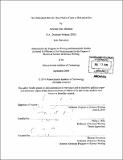| dc.contributor.advisor | Philip J. Hilts. | en_US |
| dc.contributor.author | Martinez, Amanda Rose | en_US |
| dc.contributor.other | Massachusetts Institute of Technology. Graduate Program in Science Writing. | en_US |
| dc.date.accessioned | 2011-01-26T14:33:16Z | |
| dc.date.available | 2011-01-26T14:33:16Z | |
| dc.date.copyright | 2010 | en_US |
| dc.date.issued | 2010 | en_US |
| dc.identifier.uri | http://hdl.handle.net/1721.1/60842 | |
| dc.description | Thesis (S.M. in Science Writing)--Massachusetts Institute of Technology, Dept. of Humanities, Graduate Program in Science Writing, 2010. | en_US |
| dc.description | Cataloged from PDF version of thesis. | en_US |
| dc.description | Includes bibliographical references (p. 28-31). | en_US |
| dc.description.abstract | Plastic trash is an increasingly significant source of pollution in the world's oceans. In some remote ocean regions, it is aggregating by the ton. This thesis investigates plastic trash as an emerging marine contaminant, with a specific focus on: the history of plastic trash in the ocean; areas of aggregation; potential sources; remediation efforts; behavior of the material in terms of degradation in the marine environment; impacts to sea life and marine ecosystems; and scientific research, both ongoing and planned, that will attempt to determine further potential impacts to marine ecosystems and human health. The second part of this inquiry provides a brief explanation of what plastics are, the history of plastic polymer development and the significance of the material's incredible contributions to society. It explores briefly the growing social backlash against plastic as a result of the publicized impacts of plastic ocean trash, and concludes with an argument, which states that the problem of plastic marine pollution is not due to the nature of the material itself, but rather lies in the ways we have chosen to use it. | en_US |
| dc.description.statementofresponsibility | by Amanda Rose Martinez. | en_US |
| dc.format.extent | 31 p. | en_US |
| dc.language.iso | eng | en_US |
| dc.publisher | Massachusetts Institute of Technology | en_US |
| dc.rights | M.I.T. theses are protected by
copyright. They may be viewed from this source for any purpose, but
reproduction or distribution in any format is prohibited without written
permission. See provided URL for inquiries about permission. | en_US |
| dc.rights.uri | http://dspace.mit.edu/handle/1721.1/7582 | en_US |
| dc.subject | Graduate Program in Science Writing. | en_US |
| dc.title | The unfinished miracle : how plastics came to be lost at sea | en_US |
| dc.title.alternative | How plastics came to be lost at sea | en_US |
| dc.type | Thesis | en_US |
| dc.description.degree | S.M.in Science Writing | en_US |
| dc.contributor.department | Massachusetts Institute of Technology. Graduate Program in Science Writing | en_US |
| dc.contributor.department | MIT Program in Writing & Humanistic Studies | |
| dc.identifier.oclc | 697842124 | en_US |
